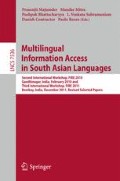Abstract
The present day users of the public information systems such as passenger query systems and patient query systems in a hospital prefer to query the system by way of SMS. In this paper, we have addressed the problem of mapping the user queries on government portals in the form of SMSes to their equivalent plain text frequently asked questions (FAQs) stored in the database. Lucene indexer has been used to index the FAQs. The score for a query SMS is determined by counting the words in the SMS at hand that have high similarity score. Experiments show high success rate on the unseen SMSes.
Access this chapter
Tax calculation will be finalised at checkout
Purchases are for personal use only
Preview
Unable to display preview. Download preview PDF.
References
Mphahlele, M.L., Mashamaite, K.: The impact of short message service (SMS) language on language proficiency of learners and the SMS dictionaries: a Challenge for educators and lexicographers. In: IADIS International Conference on Mobile Learning (2005)
Kobus, C., Yvon, F., Damnati, G.: Normalizing SMS: are two metaphors better than one? In: COLING 2008: Proceedings of the 22nd International Conference on Computational Linguistics, pp. 441–448. Association for Computational Linguistics, Morristown (2008)
Fairon, C., Paumier, S.: A translated corpus of 30,000 French SMS. In: Proceedings of LREC 2006, Genoa, Italy (2006)
Weiser, S., Cougnon, L.-A., Watrin, P.: Temporal Expressions Extraction in SMS messages. In: Proceedings of the Workshop on Information Extraction and Knowledge Acquisition, Hissar, Bulgaria, September 16, pp. 41–44 (2011)
Contractor, D., Fauquie, T.A., Subramaniam, L.V.: Unsupervised Cleansing of Noisy Text. In: COLING 2010: Proceedings of the 23rd International Conference on Computational Linguistics. Association of Computational Linguistics, Stroudsburg (2010)
Author information
Authors and Affiliations
Editor information
Editors and Affiliations
Rights and permissions
Copyright information
© 2013 Springer-Verlag Berlin Heidelberg
About this paper
Cite this paper
Gupta, A. (2013). Mapping SMSes to Plain Text FAQs. In: Majumder, P., Mitra, M., Bhattacharyya, P., Subramaniam, L.V., Contractor, D., Rosso, P. (eds) Multilingual Information Access in South Asian Languages. Lecture Notes in Computer Science, vol 7536. Springer, Berlin, Heidelberg. https://doi.org/10.1007/978-3-642-40087-2_15
Download citation
DOI: https://doi.org/10.1007/978-3-642-40087-2_15
Publisher Name: Springer, Berlin, Heidelberg
Print ISBN: 978-3-642-40086-5
Online ISBN: 978-3-642-40087-2
eBook Packages: Computer ScienceComputer Science (R0)

